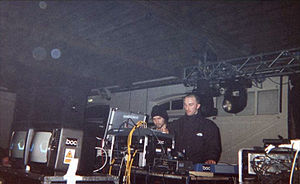Closes Vol. 1
| Boards of Canada | |
|---|---|

Mike Sandison and Marcus Eoin performing at the Warp Lighthouse Party (1999)
|
|
| Background information | |
| Also known as | Hell Interface |
| Origin | Edinburgh, Scotland |
| Genres | Electronica, ambient, IDM, techno, downtempo |
| Years active | 1986–present |
| Labels | Warp, Skam, Music70 |
| Associated acts | Odd Nosdam |
| Website | boardsofcanada |
| Members | Mike Sandison Marcus Eoin |
| Past members | Christopher Horne |
| Notable instruments | |
| Roland SH-101, Roland System-100 | |
Boards of Canada are a Scottish electronic music duo consisting of brothers Michael Sandison and Marcus Eoin. Signing to Skam and then Warp Records in the 1990s, the duo received recognition following the release of their influential album Music Has the Right to Children in 1998. They have since released a number of recordings to critical praise, including Geogaddi (2002) and Tomorrow's Harvest (2013).
The work of Boards of Canada draws on the warm analogue sounds of 1970s media and has been described as exploring themes of childhood and nostalgia. In 2012, FACT called them "one of the best-known and best-loved electronic acts of the last two decades." They have remained reclusive, rarely giving interviews or performing live.
Growing up in a musical family, brothers Michael Sandison (born 1 June 1970) and Marcus Eoin (born Marcus Eoin Sandison, 21 July 1971) began playing instruments at a young age. They experimented with recording techniques at around the age of 10, using tape machines to layer cut-up samples of found sounds over compositions of their own.
In their teens they participated in a number of amateur bands. However, it was not until 1986 when Marcus was invited to join Mike's band that Boards of Canada was born, naming themselves after the documentary TV films by the National Film Board of Canada that they watched as children. By 1989, the band had been reduced to Sandison and Eoin. In the early 1990s, a number of collaborations took place and the band put on small shows among the "Hexagon Sun" collective.
In 1995, the band made their first Hexagon Sun studio release, the EP Twoism. Like earlier Music70 releases, it was produced in a self-financed limited run and was privately distributed, primarily to friends and labels. Unlike previous releases, however, a small number of copies were also released to the public through a mailing list. Though not a widespread commercial release, it was considered of sufficient quality and worth to be subsequently re-pressed in 2002.
...
Wikipedia
